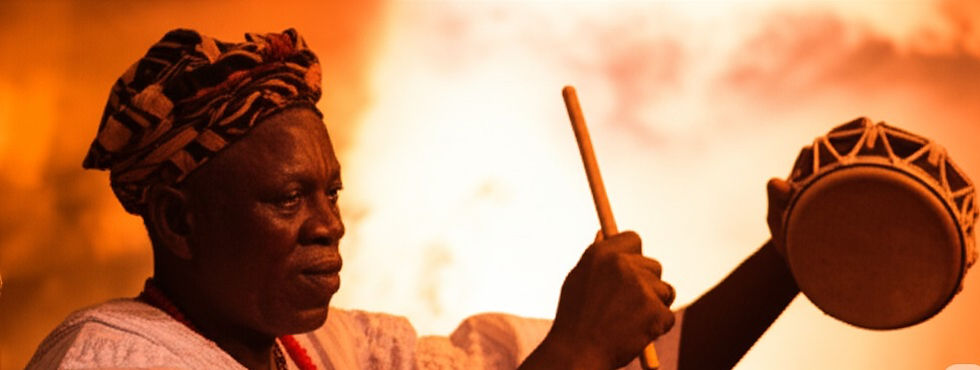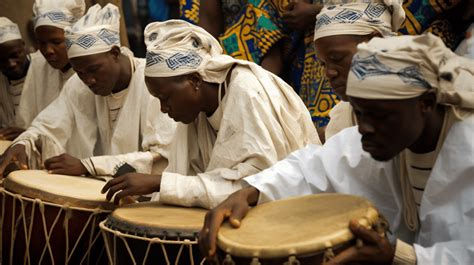The Vibration of Being: Ifá, The Spoken Word, and The Silent Languages of Aṣẹ
- ifakolade
- Aug 9
- 4 min read
In the sacred tradition of Ifá, we understand that the universe was not born in silence. It was sung into being, spoken into
existence through divine utterance. This is not a mere metaphor; it is a fundamental principle that lives within the very
structure of the Yoruba language—the original, vibrational engine of Ifá.

For those on this path, understanding the role of language is the first step from knowing about the Òrìṣà to truly communing
with them.
More Than Words: The Architecture of Reality
At its most basic, the Yoruba language is built on a foundation of three primary tones: Dò (low), Re (mid), and Mí (high). This
is not for poetic flair; it is the architecture of reality. A simple shift in pitch creates a different world of meaning. The
word oko can mean a hoe, ọkọ́ a husband, and ọkọ̀ a vehicle.
This precision is our first clue that sound, in the Ifá worldview, is a tool for creation, not just description.
The Word as Living Aṣẹ

In Ifá, Aṣẹ is the divine power to create and make things happen. This power is not abstract; it is carried on the Ẹ̀mí (the
breath of life) and directed through sound. An ọfọ̀ (incantation) is not a hopeful prayer; it is a spiritual command whose
effectiveness depends entirely on perfect tonal execution.
To speak a word with the correct tones is to vibrate at the exact frequency of the thing you are naming. You are not just
describing it; you are calling its essence into being. This is why an Oríkì (praise invocation) is so powerful. When we recite
an Oríkì, we are creating a sonic sculpture of a divine force's very essence, activating and awakening their power within our
lives.
The Esoteric Engine: Invoking Reality, Not Just Describing It
Here, we move deeper. What truly happens when we speak?
The consequence of a misspoken tone during a ritual is not just a mistake; it is the act of invoking the wrong reality. If your
tones are incorrect, the Aṣẹ you have gathered is channeled toward a contrary outcome, or it dissipates entirely. Èṣù, the
divine messenger and guardian of crossroads, is the auditor of our communications. He does not carry unclear messages. A wrong
tone is an unclear message, and Èṣù teaches us the importance of precision, sometimes through harsh lessons.
This power dynamic also shifts when we consider the written word. A sacred text written without tonal marks is like a body
without a soul. Its Aṣẹ is dormant, a latent potential waiting on the page. It is only when a knowledgeable practitioner reads
it aloud—using their own breath to give it the correct tones—that the Aṣẹ is re-animated and brought back to life.
The Silent Languages: When Vibration Goes Beyond Sound
The most profound truth is that this principle of patterned vibration is not limited to sound. Aṣẹ is encoded in silent,
non-verbal languages all around us.
* Visual Language: The intricate patterns woven into Aṣọ òkè cloth or the specific sequence of colors in an initiate's ìlèkè
(beads) are not mere decoration. They are visual prayers, proverbs, and invocations—a silent Oríkì that vibrates with meaning.
* Kinesthetic Language: The sacred dances for the Òrìṣà are a language of the body. Each step and gesture is a "word" that speaks
directly to the divine. The dance of Ṣàngó is sharp and kingly; the dance of Oṣun is flowing and graceful. To dance the rhythm
of an Òrìṣà is to speak their praise with your entire being.
Even the act of divination itself is a silent utterance from Ifá, a pattern that must be seen, interpreted, and then given a
voice.
The Inevitable Question: Can I Learn Ifá Without Yoruba?

Imagine Ifá as a magnificent palace. Without the language, you can stand in the courtyard, study its blueprints (translations),
and admire its beauty from a distance. This is a valid and meaningful path.
However, the Yoruba language is the master key to every single door inside that palace.
You can gain a foundational understanding of Ifá's philosophy without it. But to move from being an admirer to a resident—to
activate an incantation yourself, to grasp the multi-layered wisdom in a single verse, to feel the chant resonate in your
soul—the language is indispensable.
To learn the language is to claim your spiritual sovereignty. It is a declaration that you wish to drink from the river of
wisdom yourself, not just from the cup brought to you by others. The journey into Ifá is lifelong. Learning Yoruba is not a
barrier to entry; it is a sacred and essential part of the path itself.
Aṣẹ.




Comments